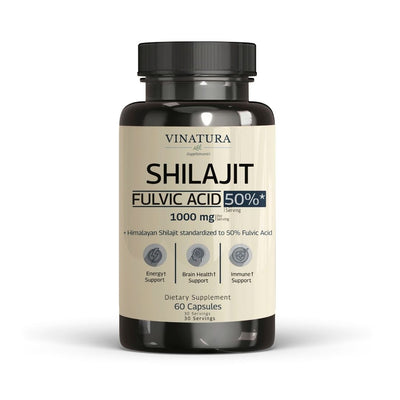
10 Foods You Should Avoid Consuming With Shilajit
Which foods should be avoided with Shilajit to help consume Shilajit for the best results? Shilajit, known for its numerous benefits, is a natural substance used for centuries.
By understanding the potential interactions, you can make an informed decision about how to incorporate Shilajit into your wellness routine.
Before exploring further, please read the disclaimer located at the end of this webpage.
What Are Shilajit and Its Key Benefits?
It has been formed over centuries by the slow decomposition of flora in the rocky mountain layers.
Shilajit has a characteristic black color like asphalt, containing many natural substances from hundreds of years.
Humic acid and fulvic acid are two natural ingredients that bring many human health benefits.
Here are some key benefits of Shilajit:
- Enhance brain function and concentration.
- Improves Testosterone Levels: Shilajit increases testosterone in men.
- Reduce fatigue: Supplementing shilajit can help the body restore energy and improve prolonged fatigue when working and studying daily.
- Slows down the aging process: Fulvic acid in shilajit can prevent aging.
- Improve muscle strength.
- Help skin disorders and improve skin health.
Related Article: Can You Take Safed Musli And Shilajit Together?
10 Foods You Should Avoid Consuming with Shilajit
Highly Processed Foods

This type of food often contains many additives, colorings, and preservatives. Consuming a lot of these foods can be harmful to your health and pose a potential risk of obesity, heart disease, diabetes,...[1].
Consuming highly processed foods such as Shilajit may reduce its effectiveness.
High-Sugar Foods
High-sugar foods, glucose, and fructose cause lipid and carbohydrate metabolism disorders in the body.
Added sugar promotes increased energy balance, weight gain, fat storage, and thus overweight or obesity [2].
Shilajit will best show its benefits when the body is in energy balance, so reducing the consumption of sugary foods can enhance the positive effects of Shilajit.
Caffeine-rich Beverages

Although moderate caffeine consumption may not negate the benefits of Shilajit, excessive consumption of caffeine-rich beverages may cause unwanted effects.
Caffeine may affect the body's pH balance or compete with certain minerals for absorption, potentially reducing the effectiveness of Shilajit [3].
Furthermore, consuming too much caffeine can lead to overstimulation, restlessness, and sleep disruption. These effects contradict Shilajit's calming and balancing properties.
Read more: Can Shilajit Be Taken With Coffee? 3 Ways To Take Shilajit
Alcohol

Alcohol is a central nervous system depressant, affecting many different functions of the body.
It can impair cognitive function, motor skills, and judgment, and excessive or frequent alcohol consumption can lead to a range of health problems, including liver damage and cardiovascular and addiction issues.
When consumed with Shilajit, alcohol interferes with the body's ability to absorb and utilize the nutrients and bioactive compounds found in Shilajit.
Alcohol can disrupt digestion, reduce nutrient absorption, and reduce Shilajit's effectiveness in supporting health.
Foods High in Oxalates

Oxalate-rich foods such as cabbage, leeks, celery, blueberries, etc. can combine with minerals in Shilajit, reducing their absorption and the effectiveness of Shilajit.
Particularly in people prone to kidney stones, excessive consumption of oxalate-rich foods combined with other factors may increase the risk of kidney stone formation.
Although Shilajit is not known to contribute to kidney stones, oxalates from dietary sources may increase this risk when consumed simultaneously [4].
Milk and Radish

Shilajit and Milk are often combined to deal with diabetes [8]. However, if you combine Shilajit and Milk, you should not use radish because it can cause digestive disorders.
Instead, separate Shilajit and milk from radishes to maximize their benefits [9].
Fatty and Greasy Foods

Fatty foods can slow digestion and reduce the absorption of nutrients from the digestive tract. It includes essential minerals and bioactive compounds found in Shilajit, which can reduce its bioavailability and effectiveness.
High-fat diets, significantly those rich in unhealthy fats like trans fats and saturated fats, can contribute to oxidative stress and inflammation in the body.
Meanwhile, Shilajit is known for its antioxidant properties, which can help counteract these effects [5].
However, consuming too much fatty and greasy foods and Shilajit can weaken its ability to minimize oxidative stress.
Spicy Food

Spicy foods can irritate the digestive tract, leading to symptoms such as heartburn, indigestion, and stomach upset.
Consuming Shilajit supports digestive health; the combination can cause these symptoms.
The intense flavor and heat of spicy foods can overwhelm the taste and palatability of Shilajit, making consumption more difficult.
Citrus Fruits

Citrus fruits may increase stomach acidity, potentially altering the pH balance and environment in which Shilajit is digested and absorbed. The acidity of citrus fruits can cause unpleasant digestive symptoms.
Read more: Can You Take Shilajit With Multivitamins Together?
Meat & Fish

Combining Shilajit with animal proteins may hinder its absorption and effectiveness.
You should maintain a reasonable diet to optimize the digestive process and enhance the body's ability to absorb nutrients. Combining meat or fish with Shilajit can lead to indigestion.
Notes to Consume Shilajit Safety and Effectively

Below are some notes when using Shilajit
- Choose high-quality Shilajit products from reputable suppliers to ensure the authentic and origin of the product.
- Always follow the manufacturer's or your healthcare professional's instructions.
- Follow recommended dosage and usage to ensure safety and effectiveness.
- Dosage: The recommended dosage is usually 300-500 mg daily, with gradual increases to assess tolerability [6].
- Cyclical Use: Take Shilajit daily for 1-3 months, then take a break before starting again.
- To maximize Shilajit absorption, the most appropriate way to take Shilajit is on an empty stomach in the morning, before breakfast [7], based on studies.
- Store Shilajit at room temperature and away from direct sunlight to preserve the quality of the product.
- Combined with a balanced diet: Use Shilajit as part of a balanced, nutrient-rich, varied diet. Make sure you consume adequate amounts of water and nutritious foods to maximize the benefits of Shilajit.
- Monitor your body's reactions: Carefully monitor how your body reacts after using Shilajit. If you experience any side effects, discontinue use and consult a professional.
- Pregnant and nursing: Avoid using Shilajit during these periods.
Conclusion
Besides the benefits of Shilajit, users should pay attention to foods that can affect the absorption of Shilajit, such as high-processed foods, high-sugar foods, caffeine, alcohol, foods rich in oxalates, fatty and greasy foods, Milk and raMilkes, spicy foods, citrus fruits, and fish meat.
Avoiding foods that interact with Shilajit is essential to receive the maximum effectiveness of this natural supplement.
By following these tips on using Shilajit safely and effectively, users can take full advantage of the benefits it brings to health.
References
- [1] Moubarac, Jean-Claude, et al. “Consumption of Ultra-Processed Foods and Likely Impact on Human Health. Evidence from Canada.” Public Health Nutrition, vol. 16, no. 12, 21 Nov. 2012, pp. 2240–2248, www.cambridge.org/core/journals/public-health-nutrition/article/consumption-of-ultraprocessed-foods-and-likely-impact-on-human-health-evidence-from-canada/22FD38DE1BB3B5CD42B843A36D9D8D25/core-reader#, https://doi.org/10.1017/s1368980012005009.
- [2] Witek, Kacper, et al. “A High-Sugar Diet Consumption, Metabolism and Health Impacts with a Focus on the Development of Substance Use Disorder: A Narrative Review.” Nutrients, vol. 14, no. 14, 18 July 2022, p. 2940, https://doi.org/10.3390/nu14142940.
- [3] Akpoghelie, O. J., et al. “Evaluation and Consequences of the PH and Caffeine Content of Energy Drinks Marketed in Delta State, Nigeria.” Journal of Chemical Society of Nigeria, vol. 45, no. 4, 7 July 2020, https://doi.org/10.46602/jcsn.v45i4.494. Accessed 8 Oct. 2020.
- [4] Choudhary, K., & Monika. (2017, November 23). Conceptual review on etiopathogenesis and management of urolithiasis in Ayurveda with proven clinical trials. ResearchGate; unknown. https://www.researchgate.net/publication/321254438_Conceptual_review_on_etiopathogenesis_and_management_of_urolithiasis_in_Ayurveda_with_proven_clinical_trials
- [5] P Usharani, & Chandrasekhar, N. (2022). Shilajit extract reduces oxidative stress, inflammation, and bone loss to dose-dependently preserve bone mineral density in postmenopausal women with osteopenia: A randomized, double-blind, placebo-controlled trial. Phytomedicine, 105, 154334–154334. https://doi.org/10.1016/j.phymed.2022.154334
- [6] Stohs, Sidney J. “Safety and Efficacy of Shilajit (Mumie, Moomiyo).” Phytotherapy Research, vol. 28, no. 4, 3 June 2013, pp. 475–479, https://doi.org/10.1002/ptr.5018.
- [7] Shankar, Uma, and Srikanthbabu Perugu. “Evaluation of Efficacy and Safety of Adjuvant Ayurvedic Therapy in Patients with Severe Post-Covid Mucor-Mycosis at a Government Tertiary Care Hospital – a Case-Control Study.” Journal of Ayurveda and Integrative Medicine, vol. 13, no. 3, 1 July 2022, pp. 100585–100585, https://doi.org/10.1016/j.jaim.2022.100585. Accessed 29 Mar. 2024.
- [8] Wilson, Eugene, et al. “Review on Shilajit Used in Traditional Indian Medicine.” Journal of Ethnopharmacology, vol. 136, no. 1, June 2011, pp. 1–9, https://doi.org/10.1016/j.jep.2011.04.033. Accessed 17 May 2022.
- [9] Das, B. (2014). Concept of Dietetics and its Importance in Ayurveda. ResearchGate; OMICS Publishing Group.
Author

Product Disclaimer
Including an ingredient or study does not evaluate, endorse, or recommend any Vinatura product or any third-party product. Some ingredients discussed may not be used in any Vinatura product.
The content of the articles has not been evaluated by the Food and Drug Administration (FDA) and is not intended to promote or endorse any specific product. Any products sold on this website are not intended to diagnose, treat, cure, or prevent any disease.
Opinions and Endorsements
Any claims, statements, or opinions expressed in the articles are those of the author(s) and do not necessarily reflect the views or opinions of the manufacturers of the dietary supplement products. The products sold on this website are separate from the content of the articles and are not directly endorsed or associated with the information presented here.
Liability Disclaimer
The author(s) of the articles, website, and manufacturers of the dietary supplement products do not assume any liability for any potential consequences arising from the use of the information provided in the articles. Ingredient effects, dosages, and safety vary by individual, formulation, and context; some ingredients interact with medications or may be unsuitable during pregnancy or lactation. It is recommended that individuals consult with a qualified healthcare professional before making any dietary or lifestyle changes, including the use of dietary supplements.
Product Usage
Please refer to the product labels and packaging for specific usage instructions and guidelines for the dietary supplement products sold on this website.
Customer Support
For any concerns or questions regarding the dietary supplement products, please contact our customer support team, who will be more than happy to assist you.






Leave a Comment
Be the first to comment.
What do you think?